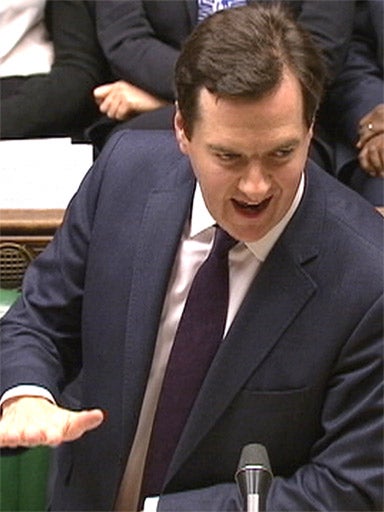Osborne plays down fears over Britain's credit rating

George Osborne today played down the prospect of Britain being stripped of its cherished AAA credit rating because of his failure to hit his targets for reducing debts.
Immediately after his Autumn Statement, the credit rating agency Fitch warned of the risk of a downgrade, explaining: “In our view, missing the target weakens the credibility of the UK’s fiscal framework, which is one of the factors supporting the rating.”
Asked if it would matter if Britain lost its covered rating, the Chancellor told the BBC: “It wouldn’t be a good thing, but the credit rating is one of a number of ways in which people look at countries.”
He added: “When people look around the world and they look at countries to invest in, they think Britain is a good investment.”
The Prime Minister’s official spokesman also insisted that the UK was attractive to overseas investors. He said: “We are currently borrowing money at the lowest interest rates in British history. The Government remains on course to meet its fiscal mandate.”
In a round of interviews today following his downbeat mini-Budget, Mr Osborne denied that the poor were bearing the brunt of austerity and rejected accusations that he manipulated the figures to make the Government's finances look healthier.
In the Autumn Statement, the Chancellor signalled that the Coalition Government would agree an extra £10bn of spending cuts by next June and admitted the “age of austerity” would last for at least another six years.
All sections of society were squeezed as the Chancellor conceded he would miss his target to reduce debt as a share of national income by 2015-16. Most working-age benefits will rise by only 1 per cent over the next three years, as the Government breaks the link with inflation.
The Chancellor had little scope to pull a rabbit out of his hat. And there was a sting in the tail for those on middle incomes as Mr Osborne’s aides admitted another 400,000 people will be dragged into the 40p higher income tax bracket by 2015, taking the figure to 4.2m. The small print of yesterday’s Autumn Statement showed that this group – a key Conservative target at the next election – will be £117 a year worse off by then.
Mr Osborne admitted that cutting the deficit was taking longer than expected but insisted: “Britain is on the right track.” But he pencilled in a further £4.3bn of spending cuts for 2017-18 to clear the deficit.
Tory and Liberal Democrat MPs welcomed two pieces of good news – the 3p-a-litre rise in petrol duty due next month was scrapped; and the amount people can earn before paying income tax, due to rise to £9,205 in April, will now increase by an extra £235 to £9,440. Mr Osborne said the Government was in “touching distance” of a £10,000 threshold, the Liberal Democrats’ flagship policy.
The Liberal Democrats signed up to a further £10bn of cuts for 2015-16 in a move that will worry some of their party activists. They insisted further savings were needed to achieve the Coalition’s mission to cut the deficit.
A government-wide spending review will be completed in the first half of next year, with the Home Office (including the police), the Ministry of Defence, the Ministry of Justice and local government among those likely to come under pressure. The Liberal Democrats will not allow any more welfare cuts on top of the £3.7bn benefits squeeze announced yesterday.
A trade-off between “wealth and welfare” by the two Coalition parties was at the heart of yesterday’s statement. Key decisions were taken at a meeting at Mr Clegg’s home, where he met Mr Osborne and Danny Alexander, the Liberal Democrat Chief Treasury Secretary.
In the private talks, the Chancellor was more open to the Liberal Democrat plans for a mansion tax or higher council tax bands for expensive properties than his public rejection of a new “homes tax” suggested yesterday. But the move was vetoed by David Cameron, who feared a backlash from natural Tory supporters. The Liberal Democrats blocked Mr Osborne’s push for a total freeze in most working-age benefits, insisting on a 1 per cent rise. They also stopped his proposal to end housing benefit for most under 25-year-olds and to limit benefits for children to the first two for new claimants – measures now likely to feature in the next Tory manifesto.
Mr Clegg also vetoed the Chancellor’s plan to bring in regional pay in the public sector, but failed to prise more money out of the Treasury to relieve the burden of childcare costs.
Mr Osborne had to swallow scaled-down forecasts on growth from the Office for Budget Responsibility (OBR), the independent fiscal watchdog, but insisted this was due to the global economy rather than his cuts. Critics seized on OBR figures suggesting that the nation’s “black hole” was barely smaller than when the Coalition took office.
The Chancellor was able to announce a surprise fall in borrowing in 2012-13, but Labour accused him of a sleight of hand by including the expected £3.5bn proceeds from the sale of 4G mobile phone licences.
Labour seized on figures from the House of Commons Library suggesting that a working family with two children and an annual income of £20,000 would lose £279 from April.
Business leaders welcomed the announcement that corporation tax will be cut by 1 per cent to 21 per cent in 2014.
Join our commenting forum
Join thought-provoking conversations, follow other Independent readers and see their replies
Comments
Bookmark popover
Removed from bookmarks